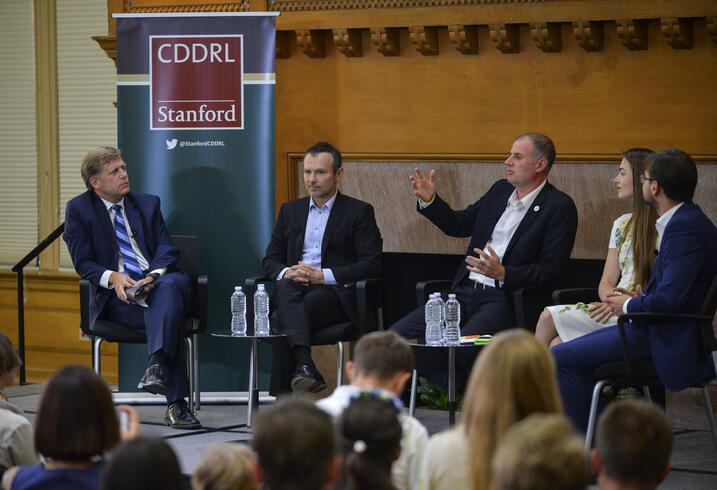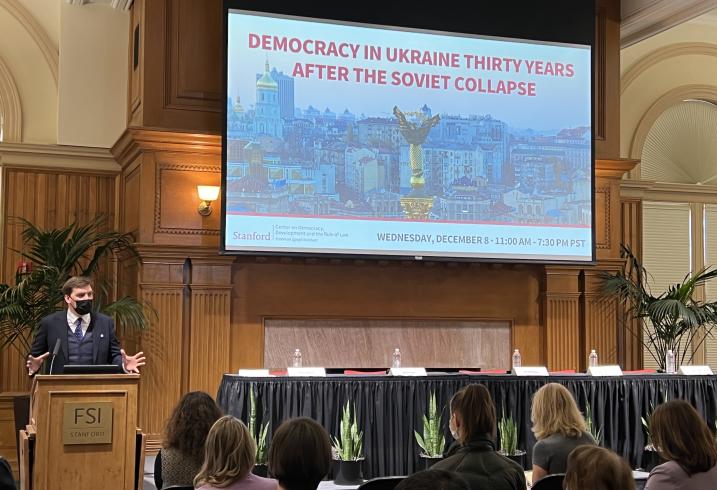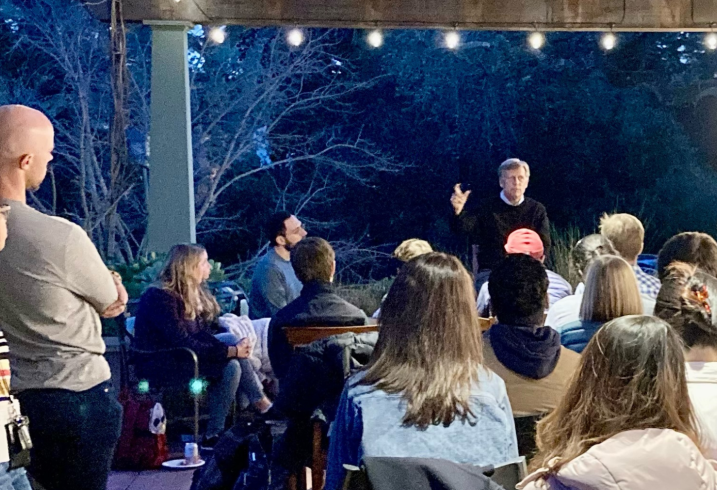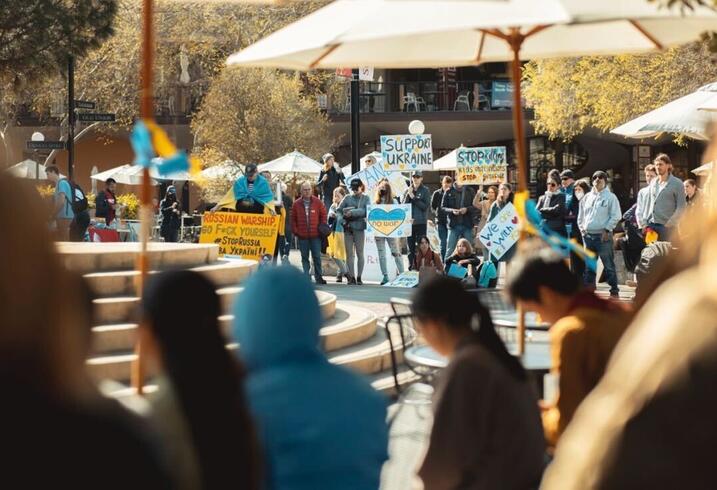A History of Unity: A Look at FSI’s Special Relationship with Ukraine
Since 2005, the Freeman Spogli Institute for International Studies has cultivated rich academic ties and friendships with Ukrainian scholars and civic leaders as part of our mission to support democracy and development domestically and abroad.

Russia’s brutal war on Ukraine hits close to home – quite literally – for Ukrainian alumni, fellows, and students in the Freeman Spogli Institute for International Studies community.
Shared values and a commitment to democracy, freedom, and civil society define the longstanding relationship between FSI and Ukraine. Since 2005, FSI has trained and educated more than 225 Ukrainians in the Ukrainian Emerging Leaders Program (UELP), the Draper Hills Summer Fellows Program, and the Leadership Academy for Development (LAD). The Bernard and Susan Liautaud Visiting Fellow program has also hosted Oleksiy Honcharuk, a former Ukrainian prime minister, for research, writing and teaching.
“We made a big bet way back in 2005 on Ukraine’s cause, and we view it as a frontline country in the global struggle for democracy,” said FSI Director Michael McFaul. He noted FSI’s first effort 17 years ago, the Summer Fellows program, which later became the Draper Hills program, has offered training for mid-career professionals from emerging democracies, including Ukraine among others.
In 2021, in another affirmation of FSI’s special connection with Ukraine, Ukrainian president Volodymyr Zelenskyy visited the institute and gave a historic speech in which he said, “The people of our country love democracy and freedom … we know that anything is possible.” It was the first and only speech Zelenskyy has given so far at an American university.

FSI scholars are now engaged with their network of Ukrainian alums, checking in on their safety and plans, while also advocating on behalf of a democratic Ukraine in major media outlets. McFaul has given Congressional testimony, written op-eds, been involved in back-channel discussions with senior administration officials, and even appeared on the Stephen Colbert show to discuss the issue. He is the co-editor of "Revolution in Orange," a 2006 book that examines Ukraine’s democratic breakthroughs.
Francis Fukuyama, the Olivier Nomellini Senior Fellow and former director of FSI’s Center on Democracy, Development and the Rule of Law (CDDRL), has recently published articles on the strategic situation in Ukraine while sharing everyone’s deep concerns for Ukrainians under assault.
“We’ve been trying to help them in any way we can,” he said.
To deepen FSI’s expertise on Ukraine, the institute has established a Director’s Fund for Ukraine Initiatives, which will provide discretionary support for research, teaching, and policy outreach on Ukraine.
From Activism to Political Leadership
Well before the Russian invasion, FSI was already helping Ukraine cultivate its democracy.
“Our theory of change,” Fukuyama said, “is that we understand we can’t do things like provide policy advice very well to a country that’s so far away from us. But what we can do is try to help train a new generation of leaders who will inherit power, and in the near future, hopefully lead the country to a better outcome as we keep in touch with and support them.”
Toward this, the Ukrainian Emerging Leaders Program provides a 10-month academic training fellowship in support of three mid-career practitioners working actively as policy-makers, legal professionals, entrepreneurs and leaders of civil society organizations in Ukraine.
Alums of this and other programs include Artem Romaniukov, a civil society activist now in Ukraine who trained in the Emerging Leaders Program during 2019-20; the former Ukrainian Prime Minister Oleksiy Honcharuk, a visiting scholar in 2021; and Nataliya Gumenyuk, a Draper Hills alum from 2018 and Ukrainian journalist who’s now writing about the war, including social media posts in real-time – “I’m reporting on the ground in Kyiv on what I see with my own eyes,” she wrote.
Oleksandra “Sasha” Ustinova, a member of the Ukrainian parliament and alum of the Ukrainian Emerging Leaders Program (2018-19), is lobbying members of Congress. “We are still negotiating for help. And I tell them that every day of negotiations is thousands of lives,” Ustinova told the Washington Post. She was in Washington, D.C., when Russia invaded Ukraine, and has been unable to return.
Svyatoslav Vakarchuk, a Ukrainian rock musician who also holds a degree in theoretical physics, was a visiting scholar in 2017-18. After his time at Stanford he created a new political party, Holos, in his country. More recently, after the Russians bombed a children’s and maternity ward in Mariupol, he posted a video on Twitter on his observations while assisting on the scene there. In another video, Vakarchuk is seen singing to Ukrainians who are sheltering in the subways. He has traveled to major cities during the conflict — including badly targeted ones such as Kharkiv, Mykolaiv, and Zaporizhzhya — raising morale among troops and civilians.





Changes may be afoot for the Emerging Leaders Program. Fukuyama said it may not be viable for next year, because Ukrainian men are currently not allowed to leave the country. “One thing we’ve been thinking of is possibly converting that program into a more research-oriented program on Ukraine,” he said.
Fukuyama said that for the Leadership Academy for Development, rather than bringing people to campus, FSI sends faculty to countries like Ukraine to deliver one-week intensive training sessions to classes of 25. He says the academy has been held in Ukraine a half dozen or so times, including in its capital of Kyiv, with an estimated 150-200 participants.
Making the transition from civil society into actual politics is one of the key messages in the 17-year-old Draper Hills Summer Fellows program, Fukuyama noted. An alumna, Svitlana Zalishchuk (’11), won a seat in Ukraine’s parliament, along with alumni Serhiy Leshchenko (’13) and Mustafa Nayyem (’14). Before joining government, Zalishchuk led a Ukrainian NGO focused on freedom of speech. After serving in parliament, all three of these alums are now working directly to defeat Putin’s invading army: Leshchenko is an aide to Zelenskyy’s chief of staff; Nayyem is the Deputy Minister of Infrastructure of Ukraine, and Zalishchuk works for Ukraine’s state-owned gas company, Naftogaz.
In a recent BBC interview, Zalishchuk said, “I think the Ukrainian president made it very clear — he will not surrender, the Ukrainian army is backing him, the Ukrainian people are backing him, and the international community also demonstrated an incredible unity to stand up to Putin.”
Long before the Russian invasion, FSI’s special relationship with Ukraine attracted prominent coverage. In 2016, The New Yorker article, “Reforming Ukraine After the Revolutions,” described how the Draper Hills Summer Fellows program helped Ukrainian journalists Leshchenko and Nayyem rise to political leadership around the time of Ukraine’s Maidan Revolution in 2014.
Fukuyama explained how the program works: “We teach them about the structures of democracy as if they were Stanford undergraduates – this is what different political systems look like, here is how you can effect political change.”
Another on-campus program designed to offer research and teaching opportunities to former senior government officials is the Bernard and Susan Liautaud Visiting Fellow program, which brought the former prime minister of Ukraine, Oleksiy Honcharuk, to FSI in 2021. Honcharuk said then, “Stanford is the best place to rethink Ukraine’s past and plan the future, and that’s why I am especially happy to be here and add my expertise and experience to this important process.”
Alum Perspective from the Frontlines
Artem Romaniukov ('20), is now in Ukraine fighting the Russians with a rifle in hand and his family nearby.
“I was with my wife and six-year-old daughter in Kyiv when Putin’s invasion of Ukraine began. I grabbed my family and brought them to a place I thought they would be safer. Then I immediately volunteered to join the Ukrainian Defense Force. I have already seen active fire, which has resulted in a dreadful number of casualties, both for Ukrainians and Russians,” he wrote in an article for FSI. He is currently in Western Ukraine awaiting a new deployment.

An entrepreneur with his own start-up company, Mriya, Romaniukov worries about the consequences the war is having on Ukraine's economy. 'For my own company, and with many Ukrainian businesses, we have managed to move our operations to safe places and are ready to export services. But international companies are concerned about the security situation and whether it is viable to place orders with Ukrainian firms. But it is crucial to keep the Ukrainian economy working right now.”
Ukrainian Student Perspectives
In a time of great uncertainty and anxiety, Ukrainian and other students on campus have found solace and solidarity at teach-ins and events hosted by FSI scholars, sharing what they’re doing to help family and friends back home and to raise awareness on campus.
Writing in the Stanford Magazine, Anastasiia Malenko, a junior studying economics and political science, described an online chat she was participating in with friends back home when the first Russian bombs began hitting Ukrainian cities. On the day after the invasion, Malenko organized a protest with a Stanford Ukrainian student group, urging immediate sanctions on Russia as well as military and humanitarian aid to the country. She also helped create a website, standwithukraine.how, and joined in the writing of a Stanford Ukrainian Community Joint Statement on Russia’s War Against Ukraine.





She later wrote in an email, “My family and friends are now demonstrating continued resilience in their fight for freedom against the Russian invaders. From coordinating humanitarian aid to managing local volunteer networks, they are writing the history of an independent democratic Ukraine.”
Malenko, who will join the CDDRL honors program as a senior, considers herself fortunate be in touch with friends and family back home. “As the rest of the world, I am hearing their stories of resilience, perseverance, pain, and calls for help … One of the bright moments is telling them about the support I’ve been witnessing on the Stanford campus and beyond — it makes them feel seen.”
She said FSI’s programs fully demonstrate the institute’s commitment to Ukraine. “Through my undergraduate career, these programs have been invaluable as they provided room for Ukrainian perspective in a field of Eastern European studies, usually dominated by the focus on Russian colonial history.”
Stanford’s Unwavering Support
FSI’s support of Ukrainian democracy reflects what Stanford stands for as a university dedicated to research, teaching and engagement – its slogan is “the winds of freedom blow.” When President Marc Tessier-Lavigne addressed the Faculty Senate on Feb. 24 shortly after the Russian invasion, he said, “There are scholars within our community who bring experience and deep insight to this range of issues, and who will help policymakers as they navigate this situation.”
He added, “It is important to remember that an international conflict of this scale will have effects and consequences for many members of our community, in many different ways. This is a difficult moment, and my thoughts are with all who are affected.”
A few days earlier, as Russian forces massed and an attack loomed, Tessier-Lavigne had joined McFaul to meet with Ukrainian students and scholars who had assembled for a dinner gathering at the latter’s home. The Stanford president was also instrumental in lighting up the iconic Hoover Tower on March 11 in the blue and yellow colors of the Ukrainian flag as a show of solidarity with the country and its people.
Policy, Research and Discovery
Steve Pifer, former U.S. ambassador to Ukraine and William J. Perry Research Fellow at FSI’s Center for International Security and Cooperation (CISAC), said the Ukrainians have resisted the Russian invasion with courage, tenacity and determination, surprising many, particularly in the Kremlin, which significantly underestimated the resistance that the Russian military would encounter.
“For many Ukrainians, this is an existential fight. If they lose, they lose their democracy, however imperfect it might be. And they also lose the vision that many, particularly the young, hold for Ukraine: to become a normal European state, such as the Czech Republic or Slovenia” he said.
Pifer has worked with CDDRL on conferences and panels on Ukraine and has many relationships with fellows from the Emerging Leaders Program. “That is a great project that gives young, rising Ukrainians the chance to study and think at Stanford about how best they can develop a modern Ukrainian state. And they have gone back to do some remarkable things.”
He says CDDRL maintains an active network of Ukrainian alumni of its programs: “It has been interesting to keep up with some of them, both via Zooms and in person when I have visited Kyiv.”
FSI scholars like Pifer have long studied Ukraine, Russia and post-Soviet bloc nations in the context of emerging democracies. In 2002, McFaul wrote about the fall of the Berlin Wall in 1989 and the collapse of the Soviet Union in 1991, and the prospects for democracy in Eastern European countries like Ukraine.
In his article “The Fourth Wave of Democracy and Dictatorship: Noncooperative Transitions in the Postcommunist World,” McFaul noted that “the balance of power and ideologies at the time of transition had path dependent consequences for subsequent regime emergence,” whether democratic, partially democratic or autocratic.
In another essay, “Indifferent to Democracy” prescient of FSI’s future Ukrainian efforts, he argued for boosting democratic aspirations in those countries by “empowering human rights activists through high-level meetings with U.S. officials” and launching “assistance programs designed to strengthen the independent media, trade unions, political parties, civil society and the rule of law.”
In February of this year, as Russia built up its forces near Ukraine, McFaul wrote about Russian president Putin’s greatest fear: “To Putin, the Orange Revolution undermined a core objective of his grand strategy: to establish a privileged and exclusive sphere of influence across the territory that once comprised the Soviet Union.”
Rose Gottemoeller, the former Deputy Secretary General of NATO and Steven C. Házy Lecturer at CISAC, has written that, “In some ways, the simplest solution for NATO and the United States would be for Ukraine to decide that it didn’t want to join NATO, take it out of the constitution, and reinsert a provision about nonalignment.” However, she notes that the U.S. should make it clear that Ukraine won’t be ready for this for decades, and that a “moratorium is the best way of doing this at this point.”
On Russia’s misinformation efforts, Kathryn Stoner, the Mosbacher Director at CDDRL and an expert on Russian politics, told the Los Angeles Times that Russian outlets like RT harbor Russian propaganda.
“It is definitely the mouthpiece of the Russian government,” said Stoner, author of the 2021 book, "Russia Resurrected: Its Power and Purpose in a New Global Order."
Fukuyama makes an optimistic case for what the post-invasion world might look like: “A Russian defeat will make possible a ‘new birth of freedom,’ and get us out of our funk about the declining state of global democracy. The spirit of 1989 will live on, thanks to a bunch of brave Ukrainians.”
Scholars Making an Impact
Beyond direct efforts to support Ukraine and engagement with students and alumni, many FSI faculty are conducting research and sharing expertise on issues related to the conflict.













